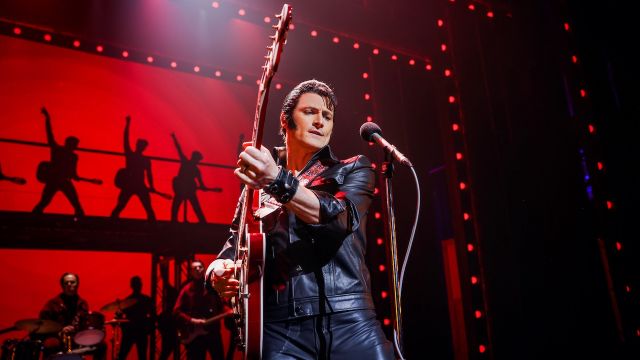Elvis – A Musical Revolution
In 1968, Elvis-mania was fading fast – teenagers screamed instead at the Beatles, the radio stations blasted Dylan and the Stones, rather than Presley. Exhausted from a schedule of acting in one cookie-cutter movie after another, Elvis was depressed and most thought that was how he would fade away from the music industry. Instead, he worked around his hardline manager, ‘Colonel’ Tom Parker and rewrote a Christmas TV special to relaunch his career.
Rob Mallett is Elvis, and whilst he doesn’t set out to mimic every aspect of his voice and movement, it’s a better performance because of that. Mallet is a great performer, with the right kind of soulful voice, a hint of a curled lip, and wiggling hips. And his characterisation of the man, from timid delivery driver to arrogant perfectionist, does tell a story. The chronology goes back and forth from when he was a kid to a star, and director Alister Smith has both adult and child Elvis on stage at the same time – the younger kid watching the older man as he navigates the life of a rock and roll star.

Adelaide local Nemanja Ilic plays Elvis as a child – and he is a revelation: his acting, singing and dancing are superb: he is at the same high standard of the movement and dancing of the much more experienced ensemble – and as Kid Elvis, Ilic’s interactions with his mother, the record store owner, and the musicians that influenced and encouraged him, are so natural it’s hard to believe he’s only nine years old.
Kirby Burgess as Ann-Margret is extraordinary. From the moment she bursts onto stage in brilliantly executed choreography, she captures the attention – away from Elvis too. Her timing is impeccable, her movement slick – and her attraction to Elvis clear without being overwrought.
Noni McCallum is also excellent, a sympathetic interpretation of Elvis’ mother, a woman who gets a little bewildered in the stardom of her son. Sienna Embrey’s Dixie bounces around wonderfully as Elvis’s high school sweetheart in the first few scenes but then inexplicably disappears, whilst Annie Chiswell’s Priscilla has very little to work with: she shows strength in the nuances of flirtatious first love, but then only appears briefly to kick the story further on: to get annoyed with stories of Elvis’ indiscretions with his movie co-stars, or to present him with his new baby without a mention of a marriage.

And whilst this works well as a musical exposition, this is not great theatre – the story is told piecemeal, conflict happens apparently without reason, and what is revealed about Elvis and the people around him is a sterile version. There’s little to no mention of the various controversies that surrounded Elvis through his life: his relationship with a 14-year-old Priscilla; his drug dependencies; or Parker’s business practices. It does spend some time on the probable affair with his movie co-star Ann-Margret, and he has one scene where he’s rude to his session band, but the focus here is on his music.
This jukebox musical doesn’t set out to be a complete biography of the man, rather capturing moments that led to the revolution he made himself through what became known as ‘The Comeback Special’, and for Elvis fans, the music is enough to provide a great night of entertainment with song and dance. This production sketches the story behind the music, but not so much the story of the man himself.

The set design from Dan Potra is tremendous: various vertical and horizontal sections move to frame a scene, bringing intimacy to a small live music club and expansion for a TV studio. Lighting from Declan O’Neill is excellent too, furnishing the production with both sensitive spotlights and exciting light chases. Terrific video design from David McKinnon is the icing on the cake, cinematically placing each scene in time and place, without distracting from what’s happening on stage. Greg Ginger’s sound design is brilliantly effective, surrounding the audience with noise from a hysterical crowd, and music from the excellent band.
Daniel Puckey musically directs a tight and hugely talented group of musicians, including the always incredible Sam Leske on lead guitar, Liam Garcia-Hardman on rhythm guitar, and amazing percussion from Ben Todd. Though as the touring company decided that Adelaide doesn’t get its own programme, credit is given to the Melbourne musicians. For a production that only exists to showcase the music, that decision is at best disrespectful.

Elvis – A Musical Revolution is pure entertainment: the music, dancing and lights will wow rock and roll fans for a couple of hours. The talented ensemble cast works exceptionally hard, but ultimately, they’re let down by the selective and fragmented narrative.
Review by Mark Wickett
Photographer: Nicole Cleary
Subscribe to our E-Newsletter, buy our latest print edition or find a Performing Arts book at Book Nook.

